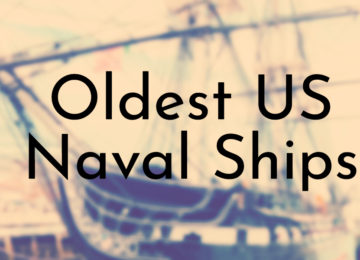Since the inception of the Internet, search engines have been the lifeline of the digital world. It’s hard to imagine how we would access information without them. Moreover, as technology has advanced, search engines have become even more advanced, allowing us to search for information, goods, and services.
But, many don’t know that search engines have been around since the early days of the Internet.
This article will explore the 17 oldest search engines ever and how they have shaped the Internet. From Yahooligans to Archie, these search engines paved the way for the modern search engines we know and use today.
So, let’s look at the 17 oldest search engines ever and how they shaped the Internet.
17. Yahooligans
Year Launched: 1998
Founder(s): Jerry Yang and David Filo
Status: Inactive
Owner(s): Verizon
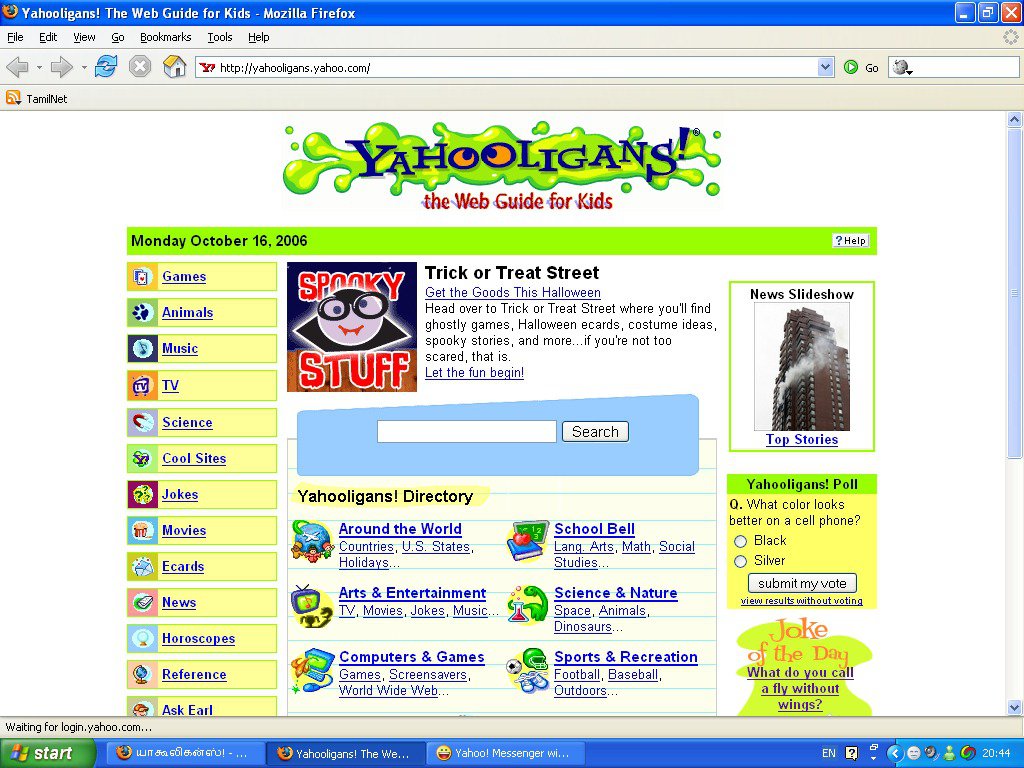
Yahooligans was a search engine for children launched in 1998 by Jerry Yang and David Filo, the co-founders of Yahoo. It was designed to provide children with a safe and educational online experience and offered kid-friendly content such as games, puzzles, and educational resources.
Yahooligans filtered out any inappropriate or harmful content and were monitored by Yahoo staff.
However, over time, the need for a separate search engine for kids diminished as online safety became a more significant concern and other search engines incorporated better filtering and parental controls. As a result, Yahooligans became inactive and was eventually acquired by Verizon.
Did You Know?
Although Yahooligans is no longer operational, it served as a pioneer in creating a safe and educational online environment for children, and its legacy lives on through similar initiatives from other companies.
16. MSN Search
Year Launched: 1998
Founder(s): Microsoft
Status: Active
Owner(s): Microsoft
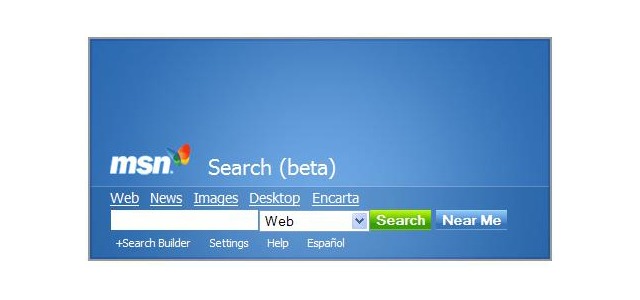
MSN Search is a search engine launched in 1998 by Microsoft. It was designed to provide search results to Microsoft’s MSN internet service users. Over time, MSN Search evolved to include new features and improve its search capabilities, eventually becoming one of the world’s most widely used search engines.
Despite competition from other search engines, MSN Search remained popular due to its integration with Microsoft’s other products and services. Today, MSN Search is still active and is owned and operated by Microsoft. As a result, many people still use MSN Search, which provides reliable search results and user-friendly features.
Did You Know?
Its search capabilities have been largely integrated into Bing, Microsoft’s current search engine platform.
15. Google Search
Year Launched: 1998
Founder(s): Sergey Brin and Larry Page
Status: Active
Owner(s): Google LLC

Google Search is an internet search engine founded by Sergey Brin and Larry Page in 1998. Google LLC owns and operates it and is the world’s most popular search engine. Google Search uses algorithms to search billions of web pages and make them available to users in seconds.
The algorithm uses a variety of factors to determine the relevance of web pages, such as keywords, content, links, and user-generated data. Using Google Search, users can easily find the information they need, such as news, images, videos, and more.
Did You Know?
Google also offers other search tools, such as Google Maps and Google Scholar, which allow users to find more specific information.
14. Northern Light
Year Launched: 1997
Founder(s): David Seuss
Status: Active
Owner(s): Equinor, Shell, and Total
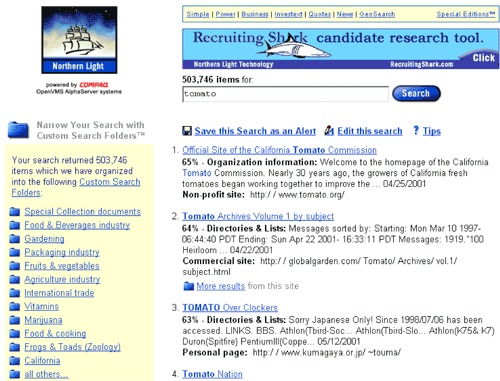
Northern Light was a search engine launched in the 1990s to provide more accurate and relevant search results than other search engines. It used a unique approach of indexing and categorizing web pages based on their content and subject matter, which allowed for more specific and targeted searches.
Northern Light also offered an extensive database of articles, reports, and other proprietary content, making it a popular choice for research and business purposes. At its peak, Northern Light was used by many universities, libraries, and corporations for research and information gathering.
Did You Know?
However, as the internet and search technology evolved, Northern Light struggled to keep up with the competition and eventually lost market share to other search engines.
13. HotBot
Year Launched: 1996
Founder(s): Wired magazine
Status: Active
Owner(s): Lycos
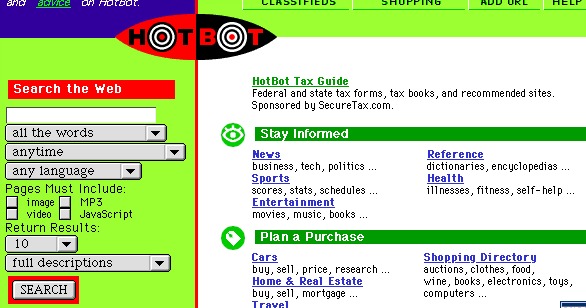
HotBot is a search engine that was launched in the mid-1990s. It was one of the earliest search engines and was known for its fast and efficient search capabilities, as well as its cutting-edge technology and user-friendly interface. HotBot quickly became one of the most popular search engines of its time, attracting a large and loyal user base.
Over time, however, HotBot faced increased competition from other search engines and needed help to keep up with the rapid pace of technological innovation in the search industry. As a result, HotBot’s market share declined, eventually becoming a niche player in the search engine market.
Did You Know?
HotBot was one of the first search engines to incorporate advanced search features, such as the ability to search by date range, file type, and language.
12. Ask Jeeves
Year Launched: 1996
Founder(s): Garrett Gruener and David Warthen
Status: Active
Owner(s): IAC Search & Media

Ask Jeeves, now known as Ask.com, was one of the early search engines that started in the mid-1990s. It was founded with a unique search approach, allowing users to type in a question in plain English and receive answers rather than just a list of web pages. This approach was innovative at the time and helped Ask Jeeves stand out from other search engines.
Over time, Ask Jeeves evolved to include more traditional search features and improved its search algorithms to provide more relevant results. Ask.com is still active and offers various online services, including search, news, and information.
Did You Know?
Ask.com has diversified into other areas, such as question-and-answer services and online advertising.
11. MetaCrawler
Year Launched: 1995
Founder(s): Erik Selberg
Status: Active
Owner(s): System1
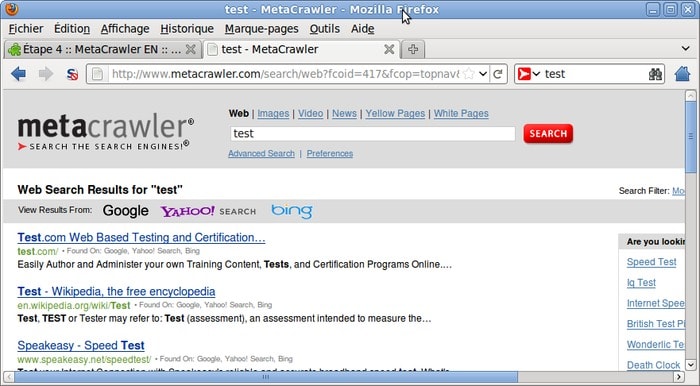
MetaCrawler is a search engine that was launched in the mid-1990s. It was one of the first search engines to incorporate results from multiple search engines into a single set of results, providing a more comprehensive and accurate search experience. This innovative approach quickly made MetaCrawler one of the most popular search engines of its time, attracting a large and loyal user base.
Over time, however, MetaCrawler faced increased competition from other search engines and needed help to keep up with the rapid pace of technological innovation in the search industry.
Did You Know?
MetaCrawler was one of the first search engines to allow users to search for information across multiple search engines simultaneously, providing a more comprehensive and accurate search experience.
10. Infoseek
Year Launched: 1995
Founder(s): Steve Kirsch
Status: Inactive
Owner(s): Disney Interactive
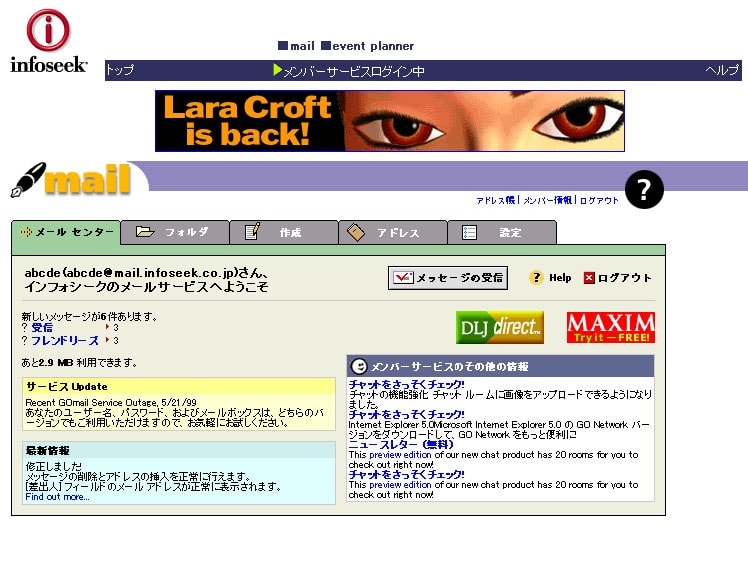
Infoseek was an early search engine launched in 1994 by Steve Kirsch. Infoseek was known for its innovative search technology and was one of the first search engines to use relevancy ranking, which helped deliver more relevant results to users.
In 1997, Infoseek introduced the first sponsored search advertising program, which became the foundation for the current search engine advertising model used by companies such as Google. The company was based in Sunnyvale, California, and was one of the pioneers in the search engine industry. Infoseek offered search results and several other features such as email, news, and directory services.
Did You Know?
In 2000, Infoseek was renamed Go.com and was eventually discontinued in 2001.
9. Excite
Year Launched: 1995
Founder(s): Joe Kraus
Status: Inactive
Owner(s): IAC Search & Media
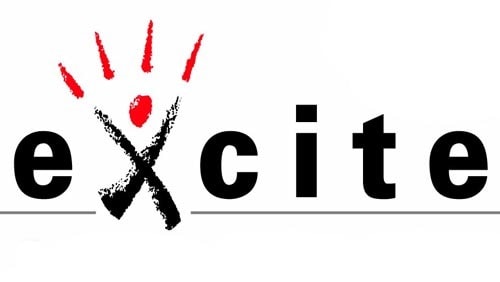
Excite was a popular search engine and web portal launched in 1995. It was one of the first search engines to use a graphical user interface and was known for its directory of websites and other content.
Excite offers various services, including search, email, news, and online shopping. The company was headquartered in Redwood City, California, and was initially funded by venture capital firms.
Excite went public in 1996 and, at its peak, was one of the top players in the search engine industry. However, the company struggled to compete with Google and other search engines and was eventually acquired by several companies, including IAC Search & Media, over the years.
Did You Know?
In 1996, Excite was the second most popular search engine behind Yahoo!
8. AltaVista
Year Launched: 1995
Founder(s): Digital Equipment Corporation
Status: Inactive
Owner(s): Yahoo, Inc.
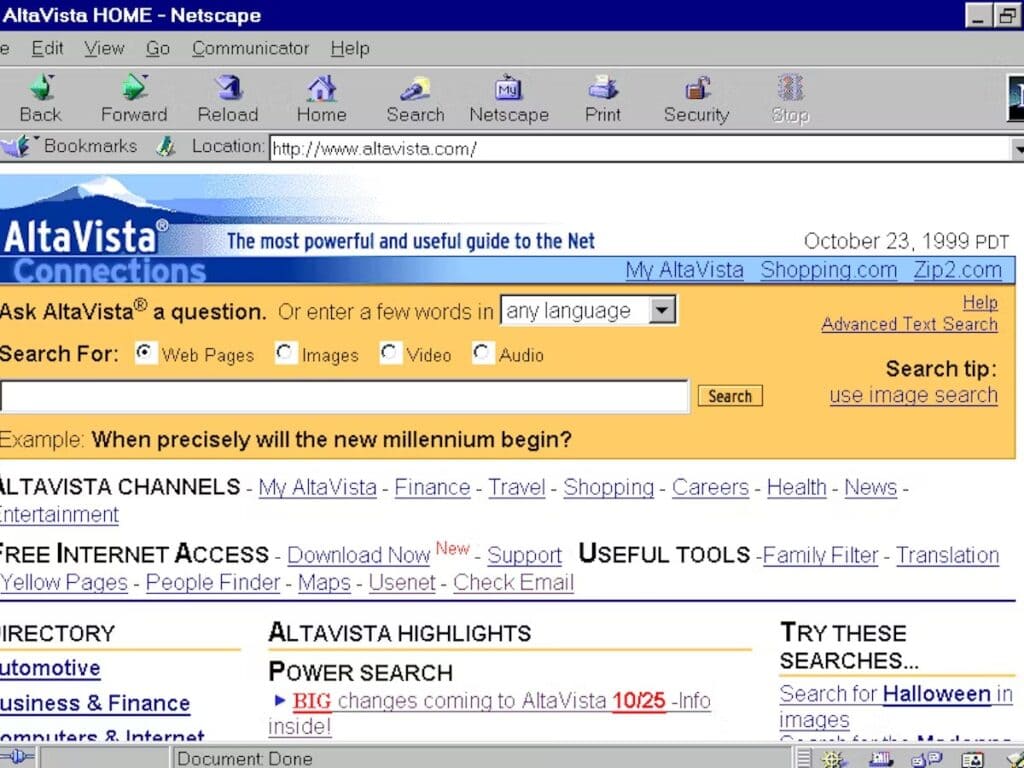
AltaVista was one of the first widely used search engines on the World Wide Web in the 1990s. It was launched in 1995 by Digital Equipment Corporation and was one of the leading search engines until the early 2000s when Google overtook it. Beforehand, it was initially launched as an experimental research project by Digital Equipment Corporation in December 1995.
AltaVista is known for its innovative features, such as the ability to search the full text of web pages and its advanced search syntax, which allows users to conduct complex searches. Yahoo eventually acquired it.
Did You Know?
The name “AltaVista” is Spanish for “high view” or “panoramic view,” reflecting the company’s goal of providing a comprehensive view of the web.
7. Yahoo!
Year Launched: 1994
Founder(s): Jerry Yang and David Filo
Status: Active
Owner(s): Verizon Communications

Yahoo! started as a directory of websites. In 1994, two Stanford University graduate students, Jerry Yang and David Filo created “Jerry and David’s Guide to the World Wide Web,” a directory of websites organized by category. Over time, the site grew in popularity and became known as Yahoo!
While it initially relied on human editors to categorize and curate the websites in its directory, the company eventually developed its own search technology and became a full-fledged search engine.
By the late 1990s, Yahoo! was one of the most popular search destinations on the web, and it continued to expand its offerings and services over the years to become one of the world’s largest and most well-known internet companies.
Did You Know?
Yahoo was one of the first search engines on the web, launching in 1995 as a directory-based search engine.
6. WebCrawler
Year Launched: 1994
Founder(s): Brian Pinkerton
Status: Active
Owner(s): System1
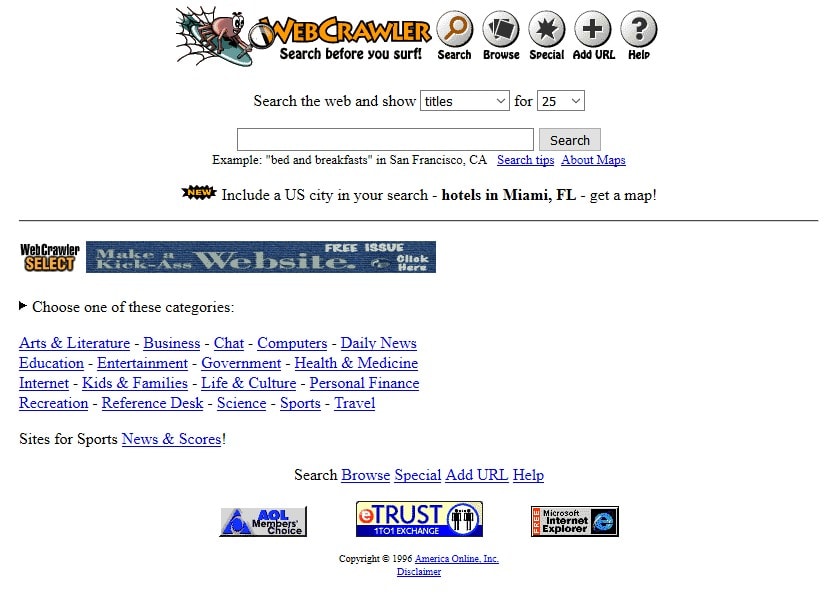
WebCrawler was one of the first search engines on the web, launched in 1994 by computer scientist Brian Pinkerton at the University of Washington. It provided full-text indexing and allowed users to search for relevant websites based on keywords. WebCrawler was known for its simple interface and fast results, and it quickly became one of the most popular search engines of the early web.
However, as the web and search technology evolved like other search engines, WebCrawler was eventually overshadowed by more advanced search engines and was eventually acquired by another company.
Did You Know?
WebCrawler was also one of the first search engines to utilize automated “spiders” to crawl and index web pages. This was a major technological innovation at the time and helped to improve the accuracy and comprehensiveness of search results greatly.
5. Lycos
Year Launched: 1994
Founder(s): Michael Loren Mauldin
Status: Active
Owner(s): Brightcom Group

Lycos is a search engine and web portal founded in 1994 and was one of the early pioneers of the Internet. It was one of the first successful search engines and offered users a variety of features, including web search, email, news, and entertainment content.
Founded by Michael Loren Mauldin of Carnegie Mellon University, it quickly gained popularity and became one of the most widely used search engines of the 1990s. Lycos was also one of the first search engines to expand internationally, launching localized versions of its site in several countries and becoming a leading search engine in many regions outside the United States.
Did You Know?
In 1998, Lycos acquired Tripod, one of the first and largest web hosting and community-building platforms, further expanding its offerings to users.
4. Galaxy/eiNet
Year Launched: 1994
Founder(s): Unspecified
Status: Inactive
Owner(s): Fox News Corporation
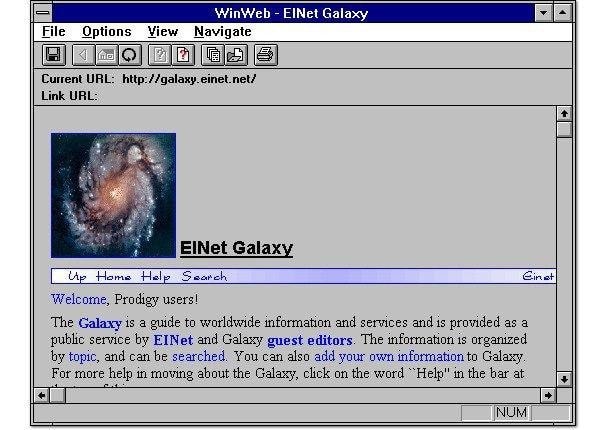
Galaxy/eiNet was introduced in January 1994 as the first directory on the Internet that could be searched. It was a part of the Einet division at the University of Texas’s MCC Research Consortium, and its goal was to create tools for directory services to aid electronic commerce.
In April 1995, SunRiver Corporation (now BoundlessTech) bought Einet and changed its name to TradeWave Corporation. Afterward, Galaxy/eiNet became a commercial entity. It was purchased by CyberGuard, an Internet security firm, in 1997 and sold to America’s Health Network in 1998.
In May 1999, Fox News Corporation became a co-owner of Galaxy/eiNet as part of the merger between America’s Health Network and FitTV.
Did You Know?
In 2000, The Health Network was sold as part of a $1 billion deal between Rupert Murdoch’s News Corp and WebMD, and Galaxy/eiNet was spun off into its own company, Galaxy.com, LLC.
3. Aliweb
Year Launched: 1993
Founder(s): Martijn Koster
Status: Active
Owner(s): Nexor
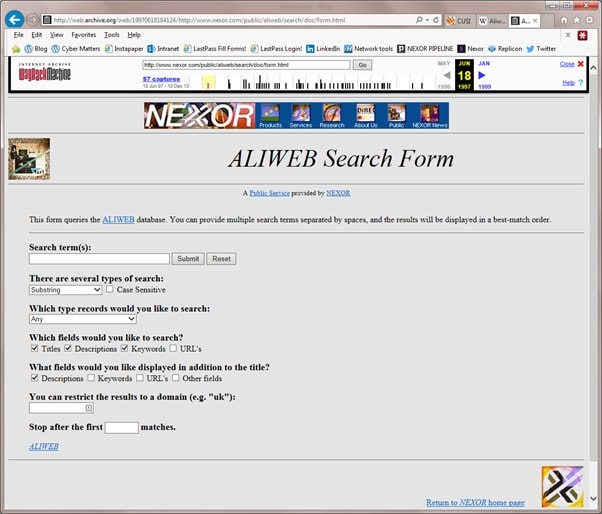
Aliweb was one of the first search engines on the Internet, predating even Google. It was created in 1993 by Belgian student Martijn Koster and became the first search engine to index the entire Web using a robot. The name Aliweb stood for “Archie-Like Indexing for the Web.”
Aliweb allowed users to submit their websites to be included in the search engine’s database, providing a simple interface for searching the web. Although it was one of the earliest search engines, Aliweb never gained widespread popularity. It was eventually overtaken by other search engines that offered more advanced features and a better user experience.
Did You Know?
Despite its limited success, Aliweb is considered an important milestone in the history of the Internet and search technology, as it was one of the first attempts to index and make sense of the rapidly growing World Wide Web.
2. Veronica
Year Launched: 1992
Founder(s): Steven Foster and Fred Barrie
Status: Inactive
Owner(s): Steven Foster and Fred Barrie
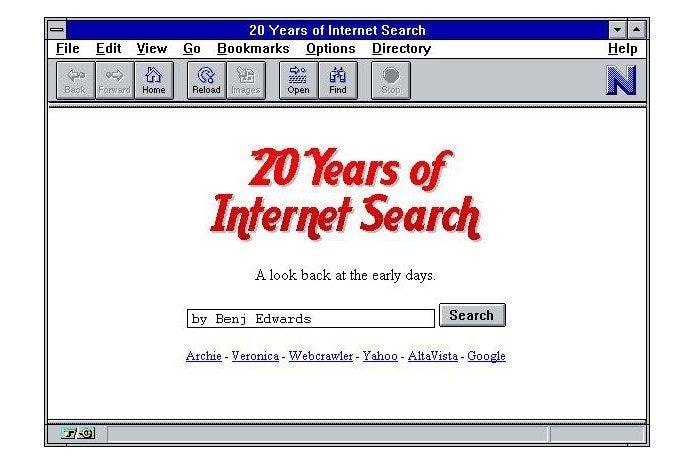
Veronica was a search engine developed at the University of Nevada, Reno, in the early 1990s. It was created as part of the Gopher project, an early decentralized information system predating the World Wide Web. Veronica was designed to search Gopherspace, a collection of Gopher servers that offered a wide range of information, including documents, images, and other files.
Unlike the web, which was designed to be a graphical interface for information, Gopher was primarily a text-based system and relied on simple menu-driven interfaces for navigation. Veronica allowed users to search Gopherspace for specific information and provided results in a list of links to Gopher menu items that matched the user’s query.
Did You Know?
Although it was one of the first search engines and provided a valuable resource for users of the Gopher system, Veronica never gained widespread popularity and was eventually overshadowed by the rapid growth of the World Wide Web and web-based search engines like Google.
1. Archie
Year Launched: 1990
Founder(s): Alan Emtage
Status: Active
Owner(s): Alan Emtage
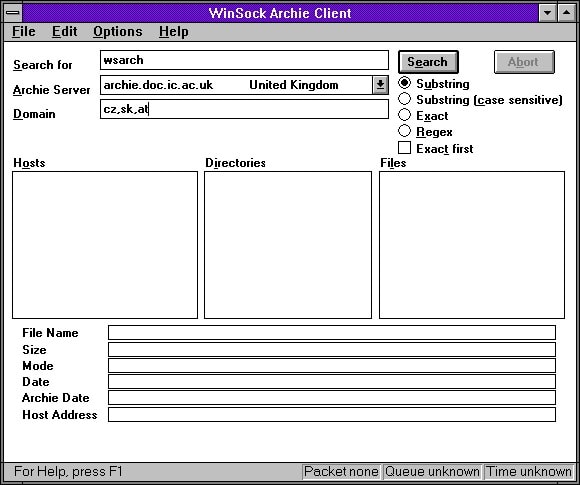
Archie is considered the first and, therefore, the oldest search engine on the Internet, created in 1990 at McGill University in Montreal, Canada. It was designed to search for files stored on anonymous FTP (File Transfer Protocol) servers and index them, making it easier for users to find the information they needed.
Archie connected to FTP servers, downloaded a list of files, and created an index of the files and their locations. This index was then made available to users, who could search for specific files using keywords or phrases.
Archie was one of the first examples of distributed computing on the Internet, as it relied on the cooperation of individual FTP server administrators to provide access to their files.
Did You Know?
The name “Archie” was inspired by the Archie comic book series and was intended to be a playful nod to the idea of indexing information.




